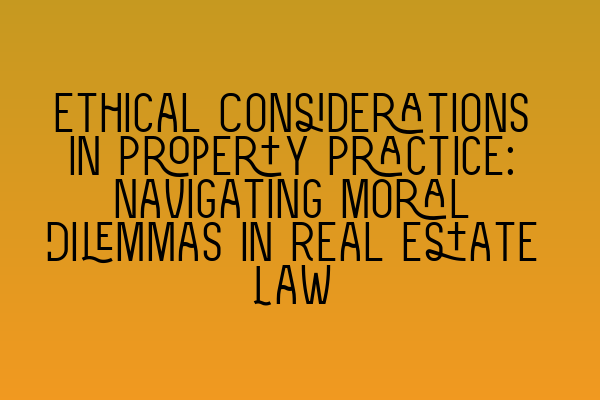Ethical Considerations in Property Practice: Navigating Moral Dilemmas in Real Estate Law
Property law is a complex field that requires practitioners to balance legal expertise with ethical considerations. In the fast-paced world of real estate transactions, it is vital for property lawyers to navigate moral dilemmas responsibly and with utmost care. This blog post explores the ethical challenges that property practitioners may encounter and offers insights on how to handle them ethically and professionally.
The Importance of Ethics in Property Practice
As property lawyers, we have a duty to act in the best interest of our clients while upholding the principles of fairness, integrity, and justice. Ethical considerations play a crucial role in maintaining the public’s trust in the legal profession and ensuring that property transactions are conducted in a just and equitable manner.
By adhering to a strong ethical framework, property law practitioners can establish themselves as trusted advisors, litigation experts, and problem solvers. This not only enhances their professional reputation but also contributes to the overall integrity of the legal system.
Recognizing Ethical Dilemmas in Property Practice
Property practitioners often face ethical dilemmas that require careful navigation. Here are some common scenarios:
- Conflicts of Interest: Property lawyers may find themselves representing clients with opposing interests, such as a buyer and a seller in the same transaction. It is essential to identify and manage potential conflicts of interest to avoid compromising client confidentiality or acting against their best interests.
- Full Disclosure: Property practitioners have an obligation to provide clients with all relevant information related to their property transactions. Failing to disclose material facts, such as property defects or legal risks, can lead to serious legal and ethical consequences. Ensuring that clients make well-informed decisions is paramount.
- Avoiding Unjust Enrichment: Property lawyers must strive to prevent unjust enrichment, which occurs when one party gains an unfair advantage at the expense of another. This may require carefully evaluating transactions to ensure fairness and equity for all parties involved.
- Safeguarding Confidentiality: Protecting client confidentiality is a fundamental ethical duty. Property practitioners must exercise caution when sharing information or disclosing details about their clients’ transactions unless authorized or legally required to do so.
- Respecting Diversity and Inclusion: Property lawyers should uphold the principles of diversity, inclusion, and equal opportunity. Treating all clients, colleagues, and stakeholders with respect and dignity is not only an ethical imperative but also contributes to a fair and just society.
Guidelines for Navigating Ethical Dilemmas in Property Practice
Understanding the ethical challenges and dilemmas that can arise in property practice is the first step towards navigating them responsibly. Here are some guidelines to help property lawyers uphold their ethical obligations:
- Stay Informed about Legal and Regulatory Changes: Keeping abreast of updates in UK property laws is essential to ensure compliance and prevent ethical lapses. Check out our article on Updates in UK Property Laws: Key Changes and Implications for more information.
- Provide Transparent and Comprehensive Advice: Effective communication is key to navigating ethical dilemmas. Property lawyers should provide clients with transparent and comprehensive advice, ensuring they are fully informed before making decisions. Our article on Legal challenges in property transactions: A comprehensive guide offers valuable insights on potential hurdles in property transactions.
- Prioritize Honest and Ethical Dealings: Upholding honesty and integrity should be at the core of property practice. Property lawyers must act honestly and ethically in all dealings, treating all parties involved with fairness, respect, and integrity.
- Seek Independent Legal Advice: In situations where conflicts of interest arise or legal complexities emerge, it may be advisable for clients to seek independent legal advice. Property lawyers should encourage clients to consider this option to protect their interests fully.
- Continued Professional Development: Property lawyers should actively engage in ongoing professional development to enhance their knowledge and skills. Staying up-to-date with changes in the legal landscape is crucial for ethical practice. Check out our article on Land Law Revision Tips: Ace Your Exam Preparation for exam preparation tips.
By adhering to these guidelines, property law practitioners can confidently navigate ethical dilemmas and contribute to a more ethical and professional legal landscape.
In Conclusion
Property law practice requires a delicate balance between legal expertise and ethical considerations. By recognizing and navigating ethical dilemmas responsibly, property lawyers can demonstrate their commitment to fairness, integrity, and justice. Upholding ethical standards not only ensures client satisfaction and trust but also contributes to the overall reputation and credibility of the legal profession.
For more insights on navigating legal challenges and ethical considerations in property practice, explore our related articles:
- Navigating Lease Laws in the UK: Essential Guidelines for Tenants and Landlords
- Dominate Property Law Questions: Avoiding Common Pitfalls
At SQE Property Law & Land Law, we are committed to upholding the highest ethical standards in property practice. Contact us today to see how our team of dedicated professionals can assist you with your property law needs.
